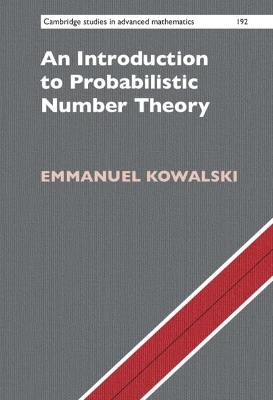
An Introduction to Probabilistic Number Theory
Seiten
2021
Cambridge University Press (Verlag)
978-1-108-84096-5 (ISBN)
Cambridge University Press (Verlag)
978-1-108-84096-5 (ISBN)
Probabilistic number theory studies the many surprising interactions between whole numbers and the theory of random processes. This incisive textbook for beginning graduate students is the first to present and explain some of the most modern developments in the field, focusing on key examples and probabilistic ideas in the arguments.
Despite its seemingly deterministic nature, the study of whole numbers, especially prime numbers, has many interactions with probability theory, the theory of random processes and events. This surprising connection was first discovered around 1920, but in recent years the links have become much deeper and better understood. Aimed at beginning graduate students, this textbook is the first to explain some of the most modern parts of the story. Such topics include the Chebychev bias, universality of the Riemann zeta function, exponential sums and the bewitching shapes known as Kloosterman paths. Emphasis is given throughout to probabilistic ideas in the arguments, not just the final statements, and the focus is on key examples over technicalities. The book develops probabilistic number theory from scratch, with short appendices summarizing the most important background results from number theory, analysis and probability, making it a readable and incisive introduction to this beautiful area of mathematics.
Despite its seemingly deterministic nature, the study of whole numbers, especially prime numbers, has many interactions with probability theory, the theory of random processes and events. This surprising connection was first discovered around 1920, but in recent years the links have become much deeper and better understood. Aimed at beginning graduate students, this textbook is the first to explain some of the most modern parts of the story. Such topics include the Chebychev bias, universality of the Riemann zeta function, exponential sums and the bewitching shapes known as Kloosterman paths. Emphasis is given throughout to probabilistic ideas in the arguments, not just the final statements, and the focus is on key examples over technicalities. The book develops probabilistic number theory from scratch, with short appendices summarizing the most important background results from number theory, analysis and probability, making it a readable and incisive introduction to this beautiful area of mathematics.
Emmanuel Kowalski is Professor in the Mathematics Department of the Swiss Federal Institute of Technology, Zurich. He is the author of five previous books, including the widely cited Analytic Number Theory (2004) with H. Iwaniec, which is considered to be the standard graduate textbook for analytic number theory.
1. Introduction; 2. Classical probabilistic number theory; 3. The distribution of values of the Riemann zeta function, I; 4. The distribution of values of the Riemann zeta function, II; 5. The Chebychev bias; 6. The shape of exponential sums; 7. Further topics; Appendix A. Analysis; Appendix B. Probability; Appendix C. Number theory; References; Index.
| Erscheinungsdatum | 28.04.2021 |
|---|---|
| Reihe/Serie | Cambridge Studies in Advanced Mathematics |
| Zusatzinfo | Worked examples or Exercises |
| Verlagsort | Cambridge |
| Sprache | englisch |
| Maße | 230 x 150 mm |
| Gewicht | 550 g |
| Themenwelt | Mathematik / Informatik ► Mathematik ► Analysis |
| Mathematik / Informatik ► Mathematik ► Arithmetik / Zahlentheorie | |
| ISBN-10 | 1-108-84096-5 / 1108840965 |
| ISBN-13 | 978-1-108-84096-5 / 9781108840965 |
| Zustand | Neuware |
| Haben Sie eine Frage zum Produkt? |
Mehr entdecken
aus dem Bereich
aus dem Bereich
Band 5: Hydraulik, Stromfadentheorie, Wellentheorie, Gasdynamik
Buch | Softcover (2024)
De Gruyter Oldenbourg (Verlag)
CHF 83,90


